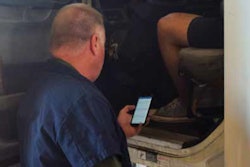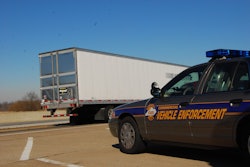Updated July 5, 2021, in advance of Operation Safe Driver, set for July 11-17, with a focus on speeding violations by both professionals and the automobile drivers with whom they share the road.
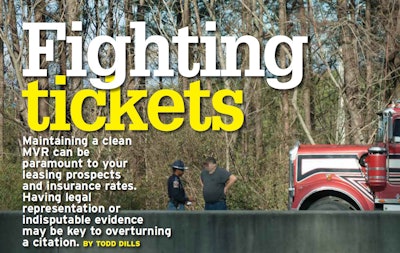
It might be one of the biggest things that commercial driver’s license holders of all stripes have in common: Sooner or later, you run afoul of an enforcement officer who decides you deserve a citation. Only a scant 8 percent of Overdrive readers in recent polling reported never having gotten one.
Tales of undeserved tickets abound. It’s no secret that truckers believe they are revenue targets for jurisdictions around the country. That was the experience of Phil Killerlain one day in the late 1990s.
As Killerlain passed a pair of officers on the roadside in Nashville, Tennessee, he noticed they were not using radar. Moments later, when one of the two pulled him over, he pointed that out. The patrolman’s response: “If I don’t write you this ticket, when I get in today, the sarge is going to check my book, and I have to have a ticket for that purple truck.”
Killerlain eventually took a defensive driving course and had the ticket removed from the record, with $75 spent. Today, that wouldn’t be possible in the vast majority of states, given the federal “anti-masking” regulation for CDL drivers codified in the early part of this century that took away the option of using defensive-driving courses to remove convictions from CDL drivers’ Motor Vehicle Records.
If you get a ticket you believe is unjustified, whether following a crash incident or other violation on the road or at a scale house, know that payment of the fine is an admission of guilt. It ensures that the ticket becomes a conviction and will follow you through at least the next few years of your career – and in some states, much longer – on your MVR. Employers are required to keep on file an annual MVR for every CDL driver they employ. Depending on the carrier, one or more convictions for safety-serious violations could be grounds for terminating a lease.
The MVR is also a prime determining factor in insurance rates for all owner-operators, whether physical damage or independents’ liability policies. “We go back three years to see if there are any claims or moving violations,” Courtney Wilson, president of 1st Guard Insurance Co., told Overdrive in 2016 regarding physical damage. “If the MVR is clear, the driver will qualify for our best rate. If there are a couple of knocks, they’ll get a mediocre rate, and if there are too many knocks, they won’t qualify.”
The good news? There is more than one way to skin the cat when it comes to fighting tickets.
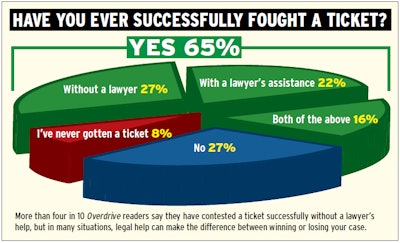
Interviews with a variety of drivers reveal a different pattern: The biggest success is seen when legal help is involved.
[Related: Some safety violations can yield criminal convictions]
Gary Buchs’ one experience with a ticket in his time leased to Landstar is a testament to the maxim. On U.S. 24 westbound out of Indiana and into his home state of Illinois, there’s a curve in the road just before the pull-off into a scale. On this particular day, “trucks were backed up so that I would have had to stop on the highway to wait to get into the scale,” he said. “So I went on past.”
There were no signs directing truckers to stop on the shoulder – “and there was no real shoulder, so I would have come to a full stop on a two-lane road.”
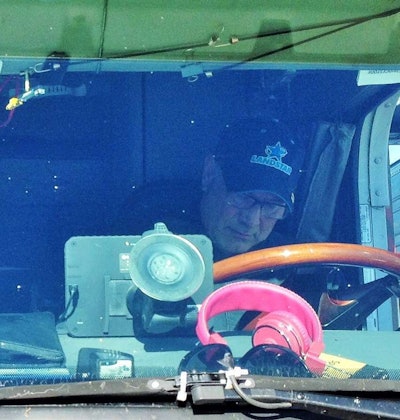 Gary Buchs
Gary BuchsAfter Buchs bypassed the scale, “a trooper caught up with me pretty quickly,” he said. “Without even asking me anything, he said, ‘You turn around and get back to that scale house.’” Buchs brought his paperwork in – he was empty – explaining then to the officer that he couldn’t have gotten off the highway safely.
“You could have just sat on the road,” the officer said.
Buchs cited the safety situation with the blind curve. “What if somebody then rear-ended me?” he said.
“I would have given them a ticket,” the officer said.
After the officer’s long search through the rulebook, Buchs was ticketed for not obeying a traffic-control device.
The ticket was a threat to Buchs’ fairly young contract with Landstar. At that time, he says, “if we blew a scale on purpose and got a ticket, it was grounds for canceling our contract.”
“Owner-operators have a really vested interest in maintaining a clean MVR,” said Brad Klepper of the Oklahoma-based Klepper Law Firm, founded in part by his father in the early 1990s. The firm, with its Drivers Legal Plan service (DriversLegalPlan.com), has expanded nationwide and is dedicated to representing truckers, maintaining and consulting a database of cases from nearly every jurisdiction in the country.
DLP’s service is a legal retainer, essentially, that members pay regularly. Membership means flat fees for handling any accident case. Yet the vast majority of what DLP does for members is representing drivers on tickets.
Another well-known service, Road Law (RoadLaw.net), functions similarly.
Oklahoma-based owner-operator Daniel Stearns first came to DLP after being dissatisfied with a more pricey legal referral service. Around 2009, when a motorist pulled in front of Stearns and he ended up “pushing them down the highway sideways,” he knew he needed help.
 Daniel Stearns
Daniel StearnsHe felt the case was the work of a scam artist. The motorist seemed less upset by the accident than Stearns, for one thing. Also, after the car had come to rest on the right edge of the divided highway, the motorist got out, looked around, “then got back in and drove it into the median to make it look like he ended up there,” Stearns said. The officer on the scene showed no interest in listening to Stearns’ side of the story, nor that of a witness who backed up Stearns’ version.
Though Stearns wasn’t a DLP member at the time, he contacted them, and they handled the case. Klepper and company today handle nonmember cases via their Interstate Trucker LTD affiliate (InterstateTrucker.com), where fees are negotiated in advance of the case. Stearns’ case cost $600 at the time, and he never had to appear in court or handle much in the way of legwork.
That wasn’t the case when he previously had attempted to represent himself in Shamrock, Texas. “It was over a tinted window, believe it or not,” Stearns said. He subsequently had the window tested by a sheriff in another district to show that it was well within the regulations for commercial trucks.
“I couldn’t afford to get there” for a court date, he said, “so I mailed my evidence in, thinking they might overturn it. They still took my money” and sided with the ticketing officer. Stearns’ case suggests a benefit to using a legal representative familiar with the processes of local courts, which can vary considerably.
[Related: When trying to help at an accident scene might hurt you instead]
Jason Lee Wilson of Maryville, Tennessee, who's left this road since this report initially aired in 2016, also learned that lesson the hard way while working as a company driver. He was ticketed south of Knoxville for a violation of Tennessee’s emergency-vehicle “move-over” law. The incident occurred at the bottom of a 6 percent grade, where a traffic light turned red as Wilson approached. Loaded, he’d just been passed on his left by a motorist and a tractor pulling a van that were stopping for the light, so moving into their lane and away from a patrol officer on the roadside would have reduced his available stopping distance quite a bit.
“I stayed in the slow lane, and I’m on my Jake,” Wilson said. “Right at the light is a highway patrolman on a shoulder, off of a shoulder, really. He’s two lanes away, essentially. The law says move over for all of these emergency vehicles – if you can’t, then reduce your speed. The light was red. I came to a complete stop.”
 Jason Lee Wilson
Jason Lee WilsonWilson speculated that what really upset the officer, who was on the phone, was the Jake brake interfering with his conversation. Wilson didn’t obtain a lawyer, but came armed to his court date with a shirt and tie, a copy of the language of the Tennessee move-over law, a picture of where it happened and more, which he submitted to the judge.
“What’s this?” the judge asked.
“An addendum to the trooper’s affidavit and a copy of the law,” Wilson began, only to be cut off by the judge. “ ‘I’ve got the law right here, boy,’ he said, and he slapped his big blue book,” Wilson recalled.
Wilson believed that if he’d had a lawyer representing him, he at least would have had a go-between who knew the judge’s temperament. It also might have led to inclusion of video evidence from the trooper’s car, which might have been favorable and was not examined during the hearing but was mentioned in conversation between the trooper and the judge.
Wilson recalled the trooper seemed to explain away the lack of video as unnecessary, given this was the first hearing. “I think a lawyer could have better handled that,” he said. “If you think you’ve got a really good case, I think you ought to get a lawyer.”
Solid evidence can help immensely. After that incident, Wilson ran with a road-facing dashcam, useful in such instances to better illustrate real-time conditions underpinning moving violations. He couldn’t discredit the trooper’s estimation that it would have been safe for him to move over, so “the judge sided with the trooper.”
[Related: The power of video evidence in fighting tickets, DataQs challenges]
Wisconsin-based independent Howard Salmon captured a somewhat similar situation with his dashcam. His fender-bender occurred at high speed, eastbound on Interstate 24 just inside Georgia, at the spot where the southbound ramp to I-59 begins.
 Howard Salmon
Howard SalmonIn his effort to evade a minivan that decided not to exit on that ramp, then stopped, crossed the median between the ramp and I-24 proper and moved into Salmon’s lane, Salmon wound up bumping a Toyota Prius that had just passed him as he and the hybrid decelerated dramatically. Though Salmon was cited for the safety-serious charge of following too close, his insurance company deemed the accident nonpreventable and paid his damage claim. The Prius driver also blamed the minivan for their collision, but all for naught: The minivan driver drove away as Salmon and the Prius stopped.
Salmon called the Georgia authorities about his video evidence of the event and was advised to request a bench trial before a traffic court judge. By the time the Dec. 15 court date rolled around, with Salmon loading down to Georgia for it and planning to represent himself, the prosecutor had seen his video of the incident.
By 9:30 a.m. he was on his way with a no-contest plea to a lesser charge and no points on his CDL, though $50 lighter. He called it a “win-win,” and one he wouldn’t have been able to achieve without video evidence, he believed.
In Wilson’s case, as he exited the court, an officer of the court told him that “in all my years of hearing people present their cases, I’ve never heard anybody present their case as well as you did. I don’t know why he sided with that trooper. He hates that trooper.”
Wilson decided that appealing the case wasn’t worth it and paid the nearly $300 fine.
If you’re going to represent yourself in court, gather as much evidence as you can, and visit the court well before your date in it, said compliance consultant Andy Blair, after a career as a police officer and certified inspector in the state. “Sit through an hour or more of traffic court, and see how it works,” he said. In many Pennsylvania jurisdictions, as in some other states, “I can represent the company at a district court proceeding [as a] person with knowledge or background” on the subject without being a lawyer. He’s won all seven cases in which he’s done so for the company.
[Related: The out of service violations for hours, lights]
For drivers representing themselves, he added, “you can handle it on your own,” but be sure you have a case first. “It’s all in knowing the laws and regulations, and how to apply them.”
Also go well-dressed and well-prepared, Blair advised. “Be nice, be respectful making your point. If you’re comfortable doing that, I think there’s no reason the person can’t do it. But there are some, maybe they have stage fright times 10. Or it could be something more significant like a fatal crash or another significant reason to have a lawyer there, as opposed to a small violation.”
As for Buchs and his ticket for bypassing the Illinois scale, given the distance of the jurisdiction from his home, he found a local Iroquois County traffic court lawyer who agreed to represent him for a flat $475 fee. The lawyer made doubly sure Buchs himself was sure he wanted to fight it, because his first thought about the case when Buchs laid it out for him was that “we never win anything out there” at the scale.
But Buchs did his research and, working with the lawyer, located the state police and DOT safety policy in such off-ramp backup situations. The policy stipulated that stopping in the roadway was the wrong move.
After the hearing, Buchs’ lawyer called him to recount what happened. “I just threw the question out there — ‘What is the policy for safety in this situation?’” the lawyer said.
The judge tilted his head and looked at the prosecutor, as Buchs tells it. “And the prosecutor says, ‘We drop the charges.’”
If you know you’re in the right, then persistence and research with a little legal help and evidence could pay dividends. —Matt Cole contributed to this story.
Also in this package on Fighting Tickets
**Don't forget DataQs to clear your PSP/CSA record
**Resources for finding legal representation



